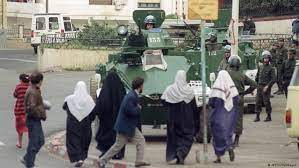Salamati Civil War
The Salamati Civil War was a conflict opposing the Salamati government, islamist groups and Ankur independentists.
Context
Salamat was an authoritarian state led by Jalil Al Kharrabi, which imposed himself to power on May 16 1977. In the late 80s however, his authority was weakening and the stability of the country dwindling ; the 1987-1991 Salamati famine, the lack of job and housing opportunities, the lack of political freedom, and international embargoes against the country weakened the country's economy (GDP decreased from 47.2 billion in 1985 to 40.7 billion in 1988) and the famine damaged infrastructures and prevented basic services (electricity, water supply, te management) from functioning properly. At the same time, decreases in the oil barrel's price and cotton price per ton (respectively 25% and 34% of the country's budget in 1986) led the citizens to suffer from inflation, which would impact the country for over 15 years, and from external debts after massive loans granted from Riamo in February, May and October 1986. (The IMF would erase most of Salamat's debt in 1997).
Furthermore,
